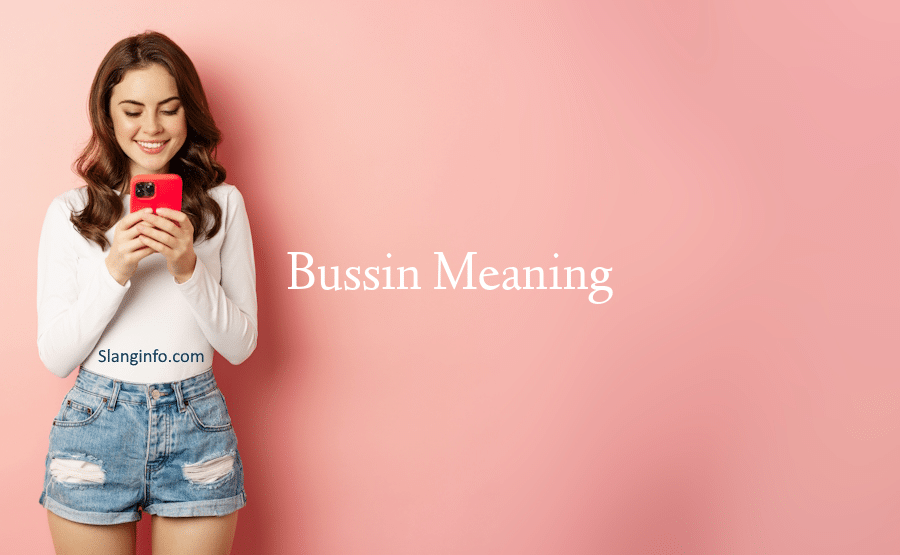Have you ever heard someone describe a meal as bussin and wondered what they meant? Or perhaps you’ve seen this word all over TikTok and can’t figure out its significance? You’re not alone. Bussin” has become one of the hottest slang terms in recent years, taking social media by storm. In this comprehensive guide, we’ll break down what bussin means, how to use it, and why it’s become so popular.
What Does Bussin Mean?
At its core, “bussin” is a slang term that means extremely good, delicious, or excellent. While it’s primarily used to describe food, its usage has expanded to cover a variety of positive experiences or things. When someone says something is “bussin,” they’re expressing strong approval or admiration.

Examples of Bussin in Use:
- “That new restaurant’s pizza is bussin!”
- “The concert last night was absolutely bussin.”
- “Have you tried this ice cream? It’s bussin, no cap.”

The Origins of Bussin
The term “bussin” is believed to have originated from African American Vernacular English (AAVE). It’s likely derived from the words “busting” or “bursting,” suggesting something is so good it’s bursting with flavor or quality.
While the exact timeline is hard to pinpoint, “bussin” gained significant popularity in the late 2010s and early 2020s, largely thanks to social media platforms like TikTok. The term quickly spread beyond its original communities and became widely adopted by internet users of various backgrounds.
How to Use Bussin in a Sentence
Using “bussin” correctly is all about context and timing. Here are some tips and examples:
- Food descriptions: This is the most common use.
- “Mom’s homemade lasagna is bussin!”
- “This new burger joint is bussin, you gotta try it.”
- Experiences or events:
- “The party last night was bussin from start to finish.”
- “That roller coaster ride was bussin, I’m still hyped!”
- As an exclamation:
- Friend: “How’s the food?”
- You: “Bussin!”
Remember, “bussin” is very informal slang. It’s perfect for casual conversations with friends or on social media, but it’s not appropriate for formal settings or professional communication.
Variations of Bussin
As with many popular slang terms, “bussin” has spawned some variations and related phrases. Two notable ones are:
Bussin with the Boys
This phrase combines “bussin” with “with the boys,” a popular expression referring to spending time with male friends. “Bussin with the boys” typically describes a highly enjoyable social experience among a group of male friends.
Example: “We’re going camping this weekend. It’s gonna be bussin with the boys!”
Bussin Buns
In the context of food, “bussin buns” specifically refers to delicious bread or sandwich buns. It’s often used to describe particularly tasty burgers or sandwiches.
Example: “The new bakery downtown has some bussin buns. Their sandwiches are next level!”
Bussin in Popular Culture
The term “bussin” has made significant inroads into popular culture, particularly in music and social media.
Music and Lyrics
Several hip-hop and rap artists have incorporated “bussin” into their lyrics, further popularizing the term. For example, Nicki Minaj released a song titled “Bussin” in 2022, featuring Lil Baby.
Memes and Internet Humor
“Bussin” has become a staple in internet memes, particularly those centered around food or social experiences. These memes often feature images of delicious-looking meals with captions like “When the food is bussin” or “Me trying not to say bussin after every bite.”
The Spread of Bussin on Social Media
Social media platforms have played a crucial role in the widespread adoption of “bussin.” TikTok, in particular, has been influential in popularizing the term through various trends and challenges.
Bussin vs. Similar Slang Terms
To better understand “bussin,” it’s helpful to compare it with similar slang terms:
| Term | Meaning | Usage Context |
|---|---|---|
| Bussin | Extremely good, delicious | Primarily food, expanding to general use |
| Gyat | Expression of surprise or admiration | General use, often for attractive people |
| WTW | “What’s the word?” or “What’s up?” | General greeting or inquiry |
| OMM | “On my mama” (emphasizing truth) | General use for emphasis |
While these terms have similar positive connotations, “bussin” stands out for its strong association with food and its more recent emergence in popular slang.
The Impact of Bussin on Language

The rise of “bussin” reflects broader trends in language evolution:
- Digital Influence: Shows how online platforms shape language development.
- Generational Markers: Acts as a linguistic identifier for younger generations.
- Linguistic Flexibility: Demonstrates how words can quickly adapt to new contexts and meanings.
Linguists often view such language evolution as a natural and interesting phenomenon, reflecting the dynamic nature of communication in the digital age.
The Future of Bussin
Predicting the longevity of slang terms is challenging, but we can make some educated guesses about the future of “bussin”:
- Mainstream Adoption: It may continue to gain popularity and potentially enter more mainstream usage.
- Evolution of Meaning: The term’s usage and connotations may shift over time, as is common with slang.
- Potential Decline: Like many internet trends, “bussin” could fade in popularity as new slang emerges.
Only time will tell how “bussin” will evolve in the ever-changing landscape of internet language.
Conclusion
“Bussin” represents more than just a trendy way to say something is delicious or excellent. It’s a window into the dynamic nature of language in the digital age. From its roots in AAVE to its widespread use across social media platforms, “bussin” showcases how quickly and effectively new linguistic expressions can spread and evolve.
Understanding terms like “bussin” isn’t just about staying current with internet slang. It’s about recognizing the power of language to connect communities, express emotions concisely, and reflect cultural shifts. As we continue to communicate in increasingly digital spaces, slang terms like “bussin” will undoubtedly play a significant role in shaping how we express ourselves online.
FAQs About Bussin
Q: Is “bussin” appropriate to use in professional settings?
A: No, “bussin” is very informal and is best reserved for casual conversations or social media interactions.
Q: Can “bussin” be used negatively?
A: Generally, “bussin” is used positively. However, like many slang terms, context is key, and in rare cases, it might be used ironically.
Q: How do you pronounce “bussin”?
A: It’s pronounced “BUH-sin,” rhyming with “cousin.”
Q: Is “bussin” only used by a specific age group?
A: While it’s most popular among Gen Z and younger millennials, its usage has spread to other age groups through social media.
Q: Are there regional differences in how “bussin” is used?
A: While the core meaning remains consistent, there may be slight variations in usage or popularity across different regions or online communities.
By staying informed about terms like “bussin,” we can better navigate the ever-evolving landscape of digital communication and understand the cultural currents shaping our language. Whether you’re trying to keep up with the latest slang or just curious about linguistic trends, understanding “bussin” is a great way to stay connected with contemporary communication styles.







